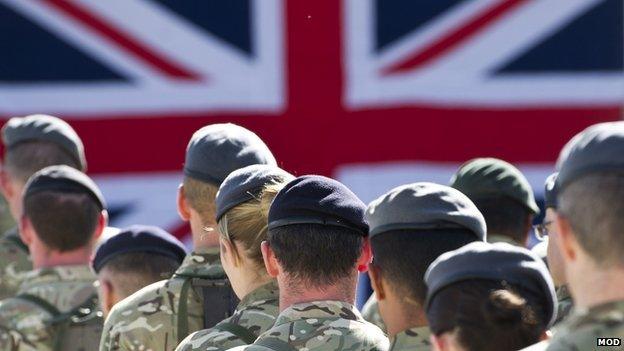Army must 'speak out' against harassment, says brigadier
- Published

The military police received 225 allegations of rape and sexual assault between 2011 and 2013
The armed forces must "redouble" their efforts to stop sexual harassment, the Army's former most senior female officer Brigadier Nicky Moffat says.
She told the BBC that leaders at all levels must "make clear that this sort of behaviour is unacceptable".
Her comments follow the conviction of Sgt Edwin Mee for 16 sex attacks on nine female recruits at Croydon's Mitcham Barracks in 2010 and 2011.
The MoD said: "We absolutely do not tolerate offences of this kind."
Brig Moffat, who served in the British forces for 27 years and retired in December 2012, said that while some leaders in the forces articulated the right messages, others "overly rely" on equality and diversity statements alone, thinking "that's the job done".
She said: "In my view, every leader needs to make clear that this sort of behaviour is unacceptable. It's about speaking out and making sure your voice is heard and understood."
'Trapped'
Brig Nicky Moffat: Military must 'redouble efforts' to ensure unwelcome sexual advances are eliminated
The brigadier argued some women felt trapped and unable to complain because they were worried not just about the impact on their jobs, but on their home lives too.
Though men and women in the forces have separate sleeping quarters, those who serve in the forces not only work together, but eat, train and socialise together.
The brigadier said that the Army was a "brilliant institution" but that any members of the forces who treated women with no respect or dignity could compromise the safety of others in culturally sensitive combat operations.
In the 2014 Armed Forces Continuous Attitude Survey, external, which was commissioned by the Ministry of Defence (MoD), 10% of the military claimed they had been the subject of discrimination, harassment, or bullying in a service environment over a 12-month period.
Research conducted last year by the charity Business in the Community found that 23% of women in the armed forces had experienced sexual harassment in the workplace in the last three years.
The survey, external of 23,000 women and 2,000 men, including 800 female service personnel, found sexual harassment to be higher in the armed forces than any other sector and more than double the average of 12% across all sectors.
Figures obtained through a Freedom of Information request show that 75 allegations of rape and 150 of sexual assault were made to military police between 2011 and 2013.

'He told me to man-up'
A female non-commissioned officer, who wanted to remain anonymous, told BBC Radio 4's Today programme she had been touched inappropriately by a comrade more than once, but she felt she could not complain because she would not be taken seriously.
"I was sat down and he came up to me and ran his hand down my thigh. I pushed it away but he kept doing it. I told him to stop it but he just told me to man-up and get over it," she said.
"You feel that if you complain, someone won't believe you, or tell you that you're not tough enough for the Army."

Independent review
Emma Norton, a solicitor for the human rights organisation Liberty, is calling for an independent review into sex attacks in the military.
She represents the family of Corporal Anne-Marie Ellement, who took her own life in 2011, aged 30, after claiming she had been raped by two soldiers while on a posting in Germany.

Cpl Anne-Marie Ellement was found dead at Bulford Barracks after claiming she had been raped
Ms Norton said: "As a result of that case, and the profile it had in the media, we at Liberty have had a lot of anonymous enquiries from women who have alleged that they have been the victims of rape in the Army.
"And they describe a similar kind of experience - a kind of complete alienation, a complete sense that the Army is incapable of dealing with their needs or meeting their needs, of making them feel like they are the problem and seeing their career fall apart in front of their very eyes.
"So one of the problems is that data on the number of allegations made is just not kept properly and its not publicly available".
'Culture shift'
According to government statistics, external, over the past few years the proportion of women in the UK forces has been rising across all three services; the Royal Navy, the Army and the Royal Air Force.
In July 2014, there were 15,780 women serving across the armed forces - or 10% of the total number of personnel.
The RAF has the highest proportion of women, with 13.9%, followed by the Royal Navy at 9.1% and the Army at 8.9%.
In a speech at Chatham House in February, the head of the Army, General Sir Nick Carter called for a cultural shift in the military, and acknowledged that a male career structure was not doing any favours for women.
He said: "It's not good enough that we still have significant number of complaints on bullying, harassment, and discrimination. There are areas we've got to attend to if we are genuinely going to be able to embrace the talent."
The MoD said: "Rape and sexual assault are abhorrent crimes which have no place in the armed forces. We absolutely do not tolerate offences of this kind and every reported incident of rape, sexual assault or harassment is thoroughly investigated.
"There is no evidence to suggest that rates of sexual offending in the armed forces are higher than in the broader population. However, we recognise the great courage it takes to come forward and report a sexual offence which is precisely why we have extensive support in place for those affected."